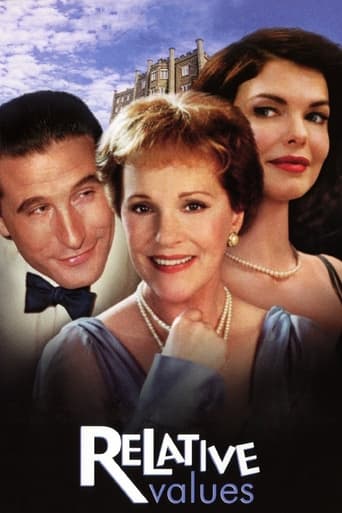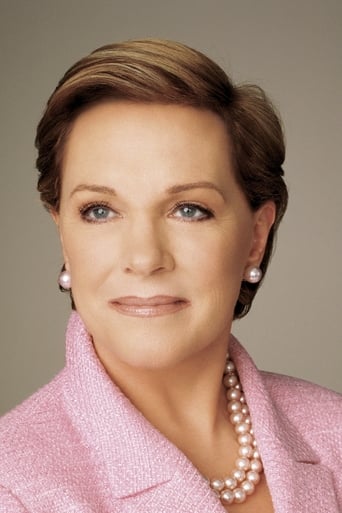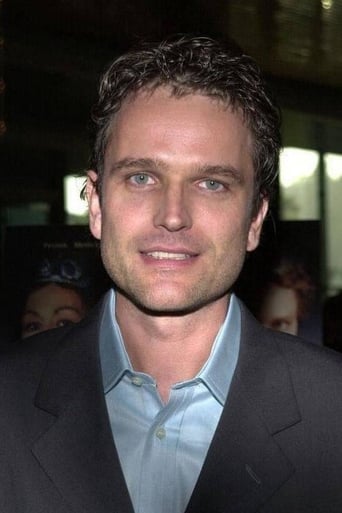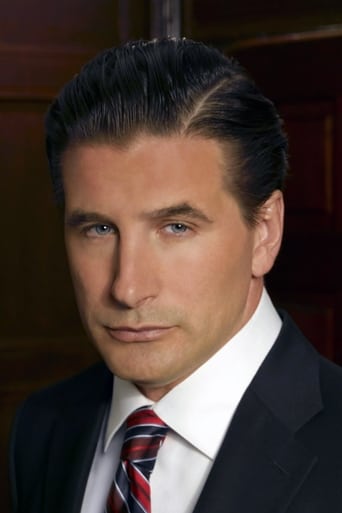Relative Values (2000)
A comedy of discriminating taste and dirty little secrets, the story is set in 1952 England, where Nigel, the Earl of Marshwood, woos Hollywood star Miranda Frayle, upsetting both his mother, Countess Felicity of Marshwood, and her former love, fellow Hollywood star Don Lucas. Right before the engagement party to be held at Marshwood, Moxie, the Countess's personal maid and best friend reveals that Miranda is her estranged sister. Crestwell, the Countess's butler, quickly devises a plan-but an inebriated Lucas's arrival at Marshwood to try to talk to Miranda causes all chaos to break loose.
Watch Trailer
Free Trial Channels
Cast


Reviews
There's a good chance the film will make you laugh out loud, but if it doesn't, there's an even better chance it will make you openly sob.
an ambitious but ultimately ineffective debut endeavor.
It’s not bad or unwatchable but despite the amplitude of the spectacle, the end result is underwhelming.
It’s fine. It's literally the definition of a fine movie. You’ve seen it before, you know every beat and outcome before the characters even do. Only question is how much escapism you’re looking for.
... sums this up succinctly if not perfectly. It is, essentially, a minor play, by the 'master', Noel Coward, adapted successfully for the screen and acted to a fare-thee-well by a well-chosen cast. Coward of course shot to fame in 1924 and piled success upon success arguably peaking in the late thirties but still weighing in with a masterpiece in the shape of In Which We Serve, written and shot during the war. He wrote Relative Values in the early fifties some four years before Look Back In Anger ushered in the 'Angry Young Man cum Kitchen Sink' mob hi- jacked the theatre and while not top-drawer Coward it still possessed sufficient style to provide a good night out at the theatre. Whilst Coward is easy to imitate he's difficult to replicate and so it is here with the odd exchange 'can we talk man to man?', 'Any other arrangement would be difficult to imagine' reaching for (and just missing) vintage Coward and a group of actors who clearly have never played Coward previously making a decent fist of it. Highly enjoyable and recommended.
This film, based on a Noel Coward play, stars Julie Andrews, as Lady Felicity Marshwood, who is upset to learn that her son, Lord Nigel (Edward Atterton) is engaged to be married to Hollywood film star Miranda Frayle (Jeanne Tripplehorn). However, the situation soon becomes even more complicated when Nigel plans to bring Miranda to meet his aristocratic family, only for the family's maid Moxie (Sophie Thompson), to announce that Miranda is in fact her sister! Throw in Miranda's co-star and former lover Don Lucas (William Baldwin) who is coming to England to try and stop the marriage, and Colin Firth and Stephen Fry as respectively Nigel's cousin Peter, and the family butler Crestwell, and the stage is set for a fine comedy!I loved this film – it did remind me somewhat of another Noel Coward adaptation – Easy Virtue, which like Relative Values, also starred Colin Firth, and which also featured the son of an upper-crust English family bringing his vivacious American girlfriend to meet his relatives, but the films play out quite differently (I loved easy Virtue too).All the cast were excellent – in particular, Thompson, Andrews and Firth. Stephen Fry was playing a role which could have been written for him, and although he is one of the supporting rather than main cast members, he certainly makes the most of his screen time. Baldwin is also very funny as the often drunk Lucas, who throws a spanner in the works of Miranda's plan to transform herself from a starlet to a Lady of the Manor. And Moxie, who is transformed from a maid, into a wealthy family friend (so that Miranda won't recognise her) is the centre of one of the funniest scenes, when Moxie gets drunk to try and overcome her fear at meeting her sister who she hasn't seen for some 20 years. Colin Firth is just adorable as Peter – it could have been a nothing role in the wrong actor's hands, but Firth is perfect.The plot itself is rather daft – why didn't they just tell Miranda that her sister was working for the family, rather than try and cover up the fact (and surely Miranda would have recognised her own sister!), but I think that it's just something that you need to go with, accept, and enjoy. Overall, this was a very funny and hugely delightful film. At just under one and a half hours, it never gets boring, the cast is top-notch, and I would certainly recommend it.
Noel Coward was probably Britain's most successful dramatist during the late twenties and thirties, and became immensely popular during the war, when his patriotic songs, plays and film scripts helped to keep up national morale. In the fifties, however, his popularity waned; his type of drawing-room comedies seemed increasingly dated, artificial and mannered. Along with Terence Rattigan and N.C. Hunter he came to represent the sort of middle-class theatre that John Osborne and the other Angry Young Men were reacting against."Relative Values", written in the early fifties, is a typical Coward comedy of manners and social class. A young aristocrat, Nigel Earl of Marshwood, announces his engagement to a glamorous film star named Miranda Frayle. Nigel's imperious mother, the dowager Countess, is vehemently opposed to the marriage; in her eyes it is simply not the done thing for aristocrats to marry members of the acting profession, particularly if they come from humble social origins. Contrary to what has been stated elsewhere, however, she is not prejudiced against Miranda because she is American. Although Miranda sounds American, she is actually British by birth. In any case, it had long been acceptable for young American women, if wealthy and from good families, to marry into the British aristocracy. Winston Churchill, for example, was born in the 1870s to an American mother, Jennie Jerome, and the Churchills are an even grander family than the one shown in this film.Two further complications arise. First, it turns out that Miranda is actually the long-lost sister of the Countess's maid, Moxie. Second, Miranda has been followed to England by her former boyfriend, Don Lucas (another film star), who still has hopes of rekindling their relationship. Lucas represents what was during this period a fairly common stereotype of Americans in Britain, especially in the upper-class circles among which Coward moved. He is a rough diamond, outwardly vulgar and lacking in social graces, but inwardly fairly decent and good-hearted.He is, in fact, one of the few decent people in the play. The Countess, for all her gracious manners and social polish, is a crashing snob. Nigel is spoilt and selfish, and Miranda is little better. Whereas Nigel and his mother are straightforward snobs, Miranda is an inverted one, who claims to have had a deprived, poverty-stricken childhood in the East End of London, much to Moxie's disgust as the family are actually from the respectably middle-class dormitory town of Sidcup. At this period, in fact, it was quite common for film stars not only to take a false name (Miranda's real name is Freda Birch) but also to invent a false life-story for themselves; Merle Oberon, for example, was actually born in Calcutta of Anglo-Indian descent but claimed all her life to be a native of Tasmania.Stephen Fry gives a nicely judged performance as the Earl's butler; he speaks to his employer and the house guests with great formality and gravitas in an inch-perfect upper-class accent, but when speaking to his fellow servants reverts to his native Estuary English. ("Estuary English" is the name given to the dialect of Kent, where the film is set, and Essex, the counties immediately to the east of London). Julie Andrews is also good as the supercilious Countess, but not all the other actors are as alert to the niceties of the British class system, which is unfortunate as it is these niceties which are Coward's major preoccupation in this play. Neither Jeanne Tripplehorn as Miranda nor Sophie Thompson as Moxie, for example, seems credible as a native of Sidcup. Miranda sounds far too American, with no hint of her English origins, even though British-born Hollywood stars of this period, such as Audrey Hepburn, Deborah Kerr and Joan Collins normally kept their native accents. Moxie either speaks in an exaggerated faux-genteel voice or else sounds exactly like the working-class Cockney that she indignantly denies being.When I have seen Tripplehorn in the past, I have always been surprised that such a glamorous actress should have spent so much of her career playing supporting roles in, for example, "Basic Instinct" or "Sliding Doors". Here, however, she gets to play a leading role, and I cannot really say that she makes the most of it. I was rather surprised to see Colin Firth, one of Britain's major stars, here playing a minor role as Nigel's cousin.The film has a rather dated feel to it; this is the only one of Coward's plays to have been made into an English-language feature film since the sixties. Even when it was written, this play represented an old-fashioned, conservative kind of theatre, and it was a rather odd choice to make it into a film some fifty years later. Like a lot of Coward's work it resists being updated to a later age, so the film-makers had no choice but to make it as a fifties period piece. The final result, however, is little more than an examination of outdated social conventions that no-one really cares about any more. 5/10
loved this film! superb cast. extraordinary acting. charming noel coward. the period, costumes, writing, charm, wit - all very clever. Steven fry, Sofie thompson, julie andrews, ted atterton, william baldwin, jeanne tripplehorn, Colin firth - all top flight. i wish more films like this were made. Hollywood need to have more faith in these types. loved seeing the clash of cultures. atterton vs. william baldwin with tripplehorn in the middle - makes for some lovely hi-jinx. found it to be a bit daring to take on an obscure coward piece in the first place. joy that they had the courage to do so. Steven fry is superb as always. i would recommend this to all. it was fab! i give it a 9.999!








